Disclosure: Links with a * are affiliate links.
Alongside fabric content, one of the things you will pretty much always see listed in a hosiery product description is a ‘denier’ number. But what does it actually mean, and what do the different hosiery deniers look like?
What is denier?
Denier in and of itself is not actually a measure of how sheer/opaque the hosiery is. It indicates how much the yarn it’s knitted from weighs. The name comes from a medieval French coin called a denier, which weighed the same as a 9,000m strand of silk, hence a single silk strand = 1 denier. The coin also weighed roughly the same as a modern gram, which is what we now use to work out denier instead. So, if 9,000m of a yarn weighs 10 grams, then any tights or stockings knitted from it will be 10 denier.
Since denier refers to the weight of the yarn, and that yarn could be packed tightly together or knitted with a more open weave, two stockings with the same denier won’t necessarily look identical. One might be more or less sheer than the other. An extreme example of this would be fishnet – even if made from 200 denier yarn, it’s still going to show a ton of skin! Most modern hosiery is knitted so that you won’t see the individual threads without close inspection, though.
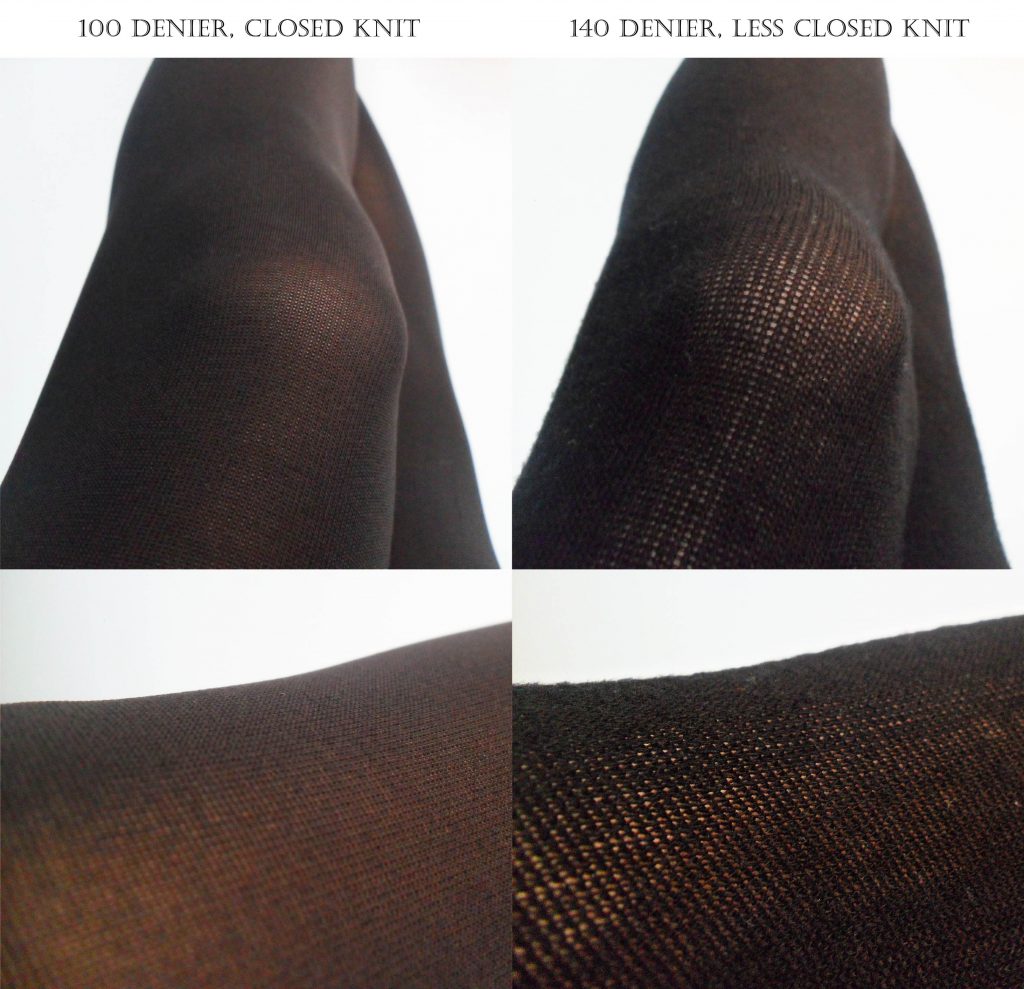
There’s also the fact that hosiery deniers are almost always rounded to the nearest 5 or 10. You’re not likely to ever see things like ‘37 denier’ tights, for example. The exception is the ultra-low deniers, where even just a few denier more or fewer can make a difference, and you do therefore get products listed as 5, 6, 7, 8, and 9 denier.
It’s worth noting that modern technology has allowed brands to create high-denier hosiery that’s still transparent – an example would be Solidea’s Venere tights, which look practically as sheer in the 140 denier version as in the 30 denier version. However, that’s not the norm.
In practice, denier is a good indicator of what opacity to expect. Heavier fibres and yarns are usually thicker, and hence will create a more opaque product. In fact, we’ve come to associate denier with opacity so much so that you’ll often see tights and stockings described as “20 denier appearance” (for example). That just means that while the actual denier is something different, the look of the product is the same you’d usually get from 20 denier hosiery.
Hosiery denier – a visual guide
So what do all of those deniers typically look like? Below are 12 examples of plain black hosiery at different deniers.
5 denier
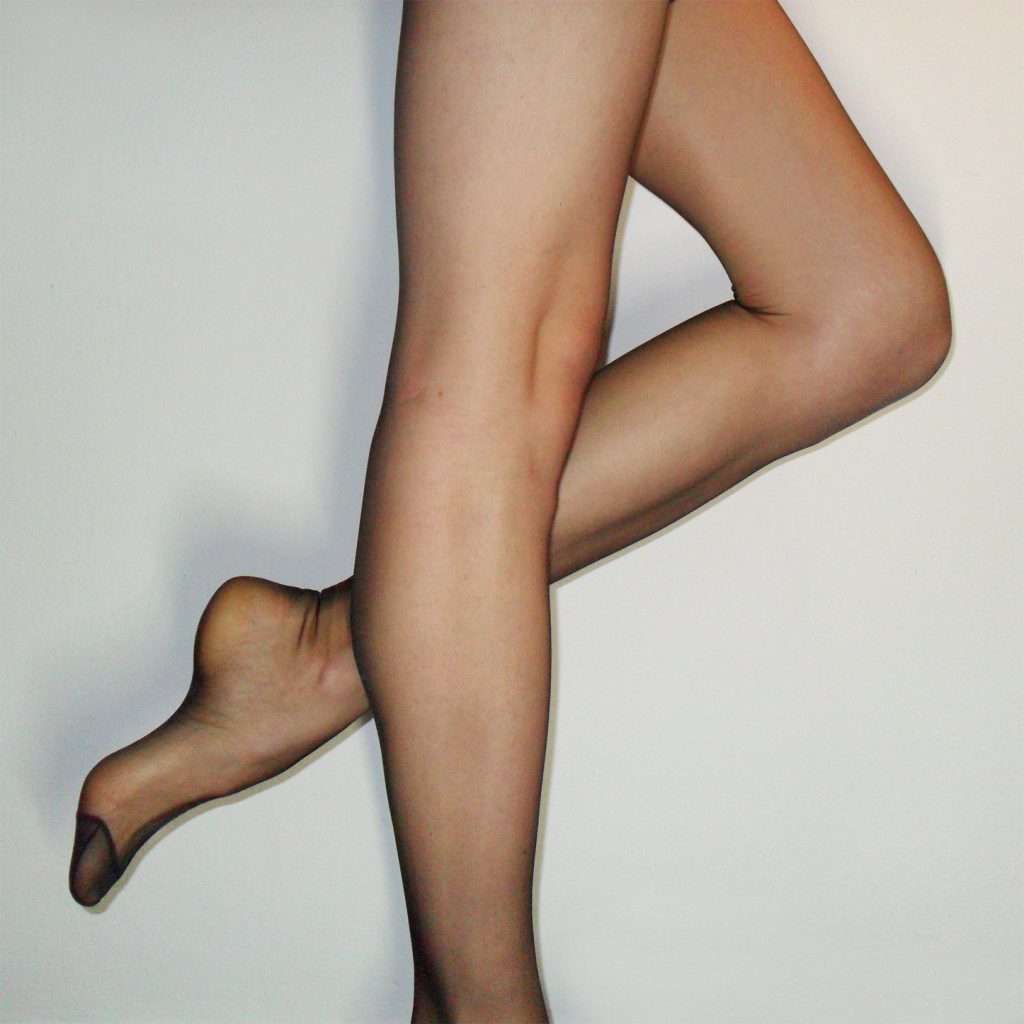
The hosiery: Pierre Balmain stockings (vintage)*
The appearance: Anything below 10 denier will be ultra sheer. If these stockings were in a nude shade similar to my own skin tone, you’d barely see that they were there.
10 denier
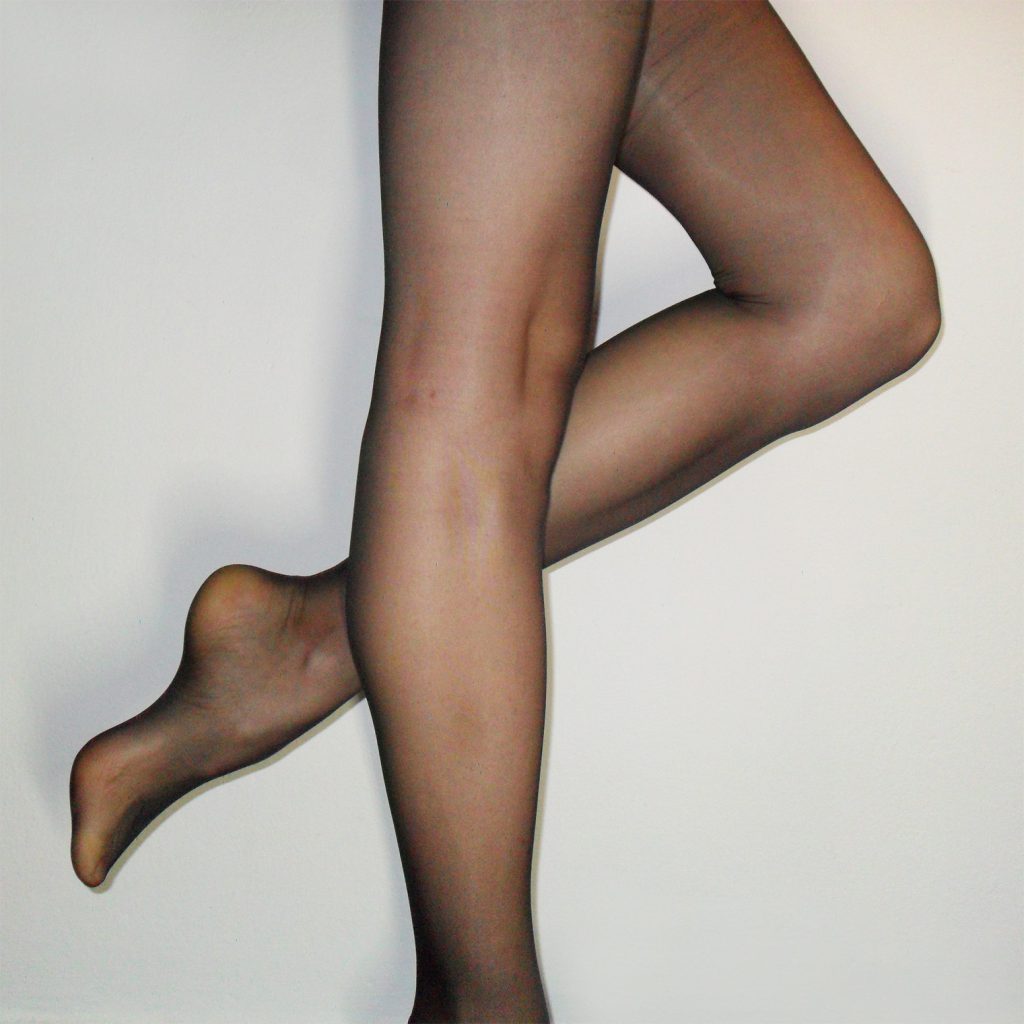
The hosiery: Charnos Elegance tights*
The appearance: 10 denier is the upper limit of ‘ultra sheer’ hosiery. However, you can see that those 5 extra denier make a marked difference, at least when we’re talking about a colour that contrasts against your skin tone.
15 denier
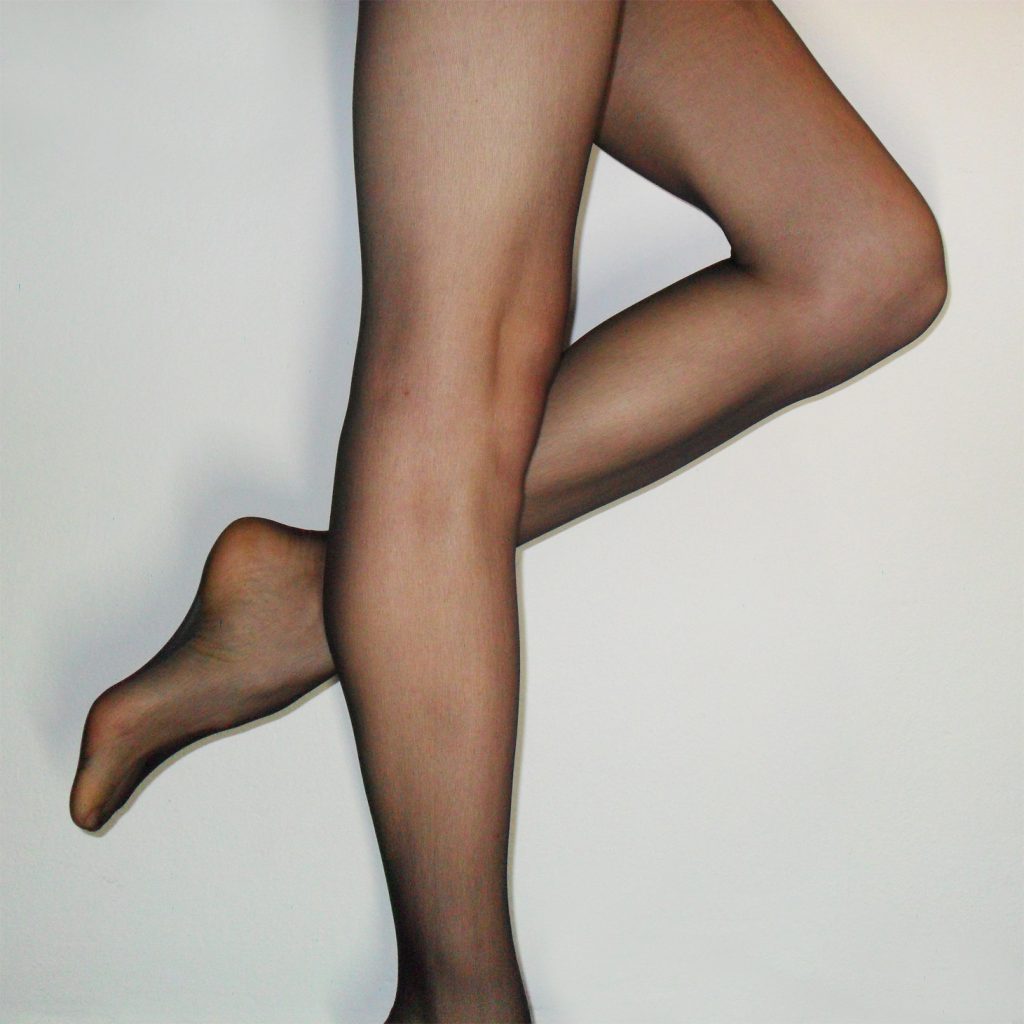
The hosiery: Elle Panache tights*
The appearance: To me, these look almost identical to the tights above. But as I have mentioned, it’s possible for two garments with the same denier to look slightly different, so another 15 denier style may appear a little darker.
20 denier
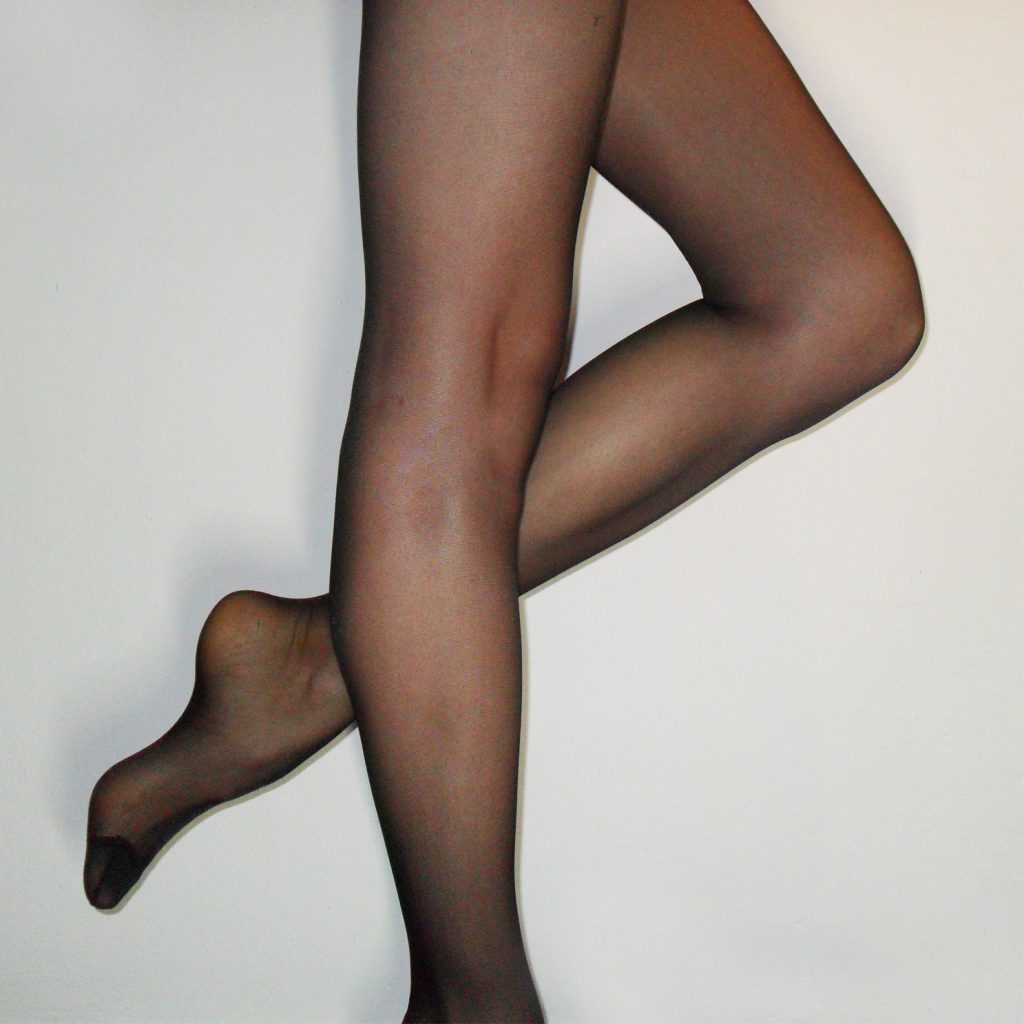
The hosiery: Mayfair Sofia stockings
The appearance: 20 is a very popular hosiery denier, striking an ideal balance between sheerness and durability. Although noticeably darker than the lower deniers, it’s still fairly translucent. But importantly, it’s less likely to snag if you so much as breathe on it. I have plenty of 20 denier stockings that have lasted me three or four winters.
30 denier
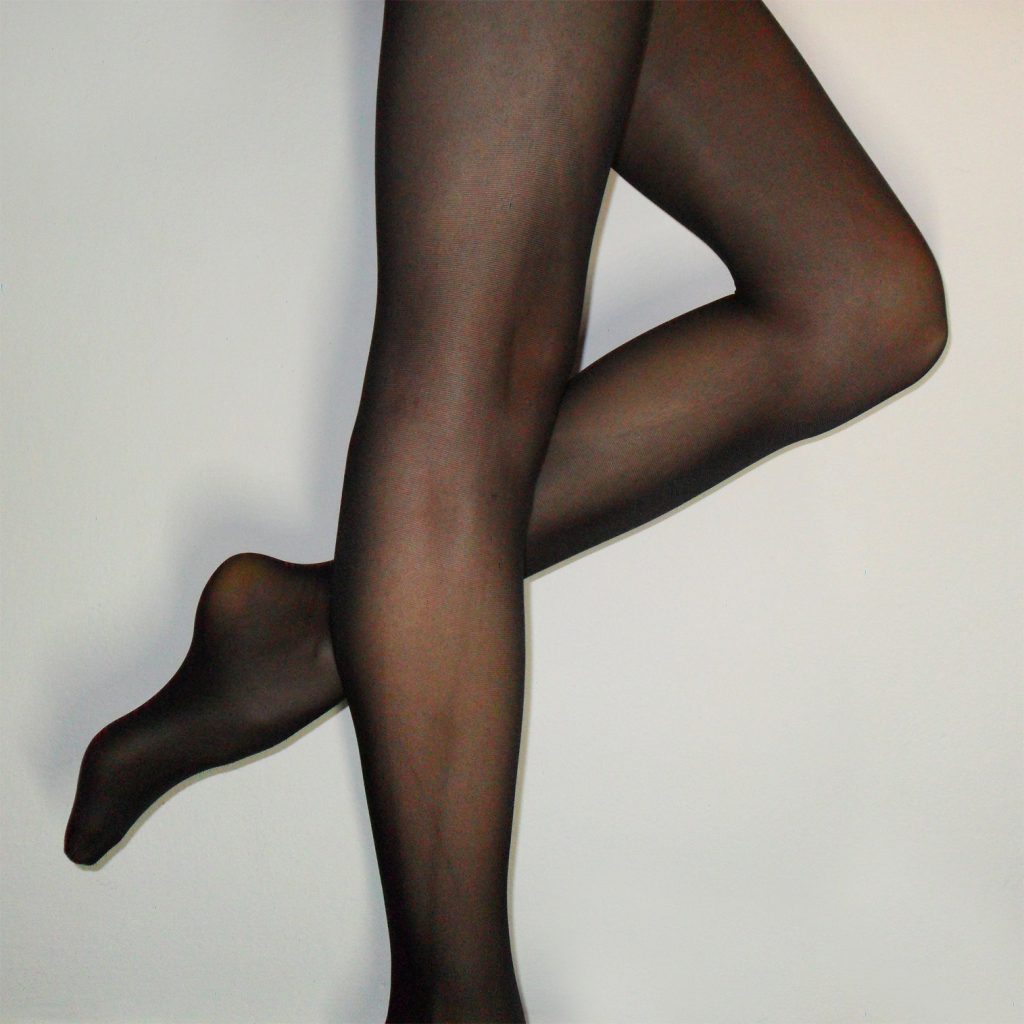
The hosiery: Charnos Satin 30 tights*
The appearance: At 30 denier, hosiery is classed as ‘semi sheer’ or ‘semi opaque’ (the terms are interchangeable). These tights would disguise a bruise or shaving rash, but definitely not a leg tattoo.
40 denier
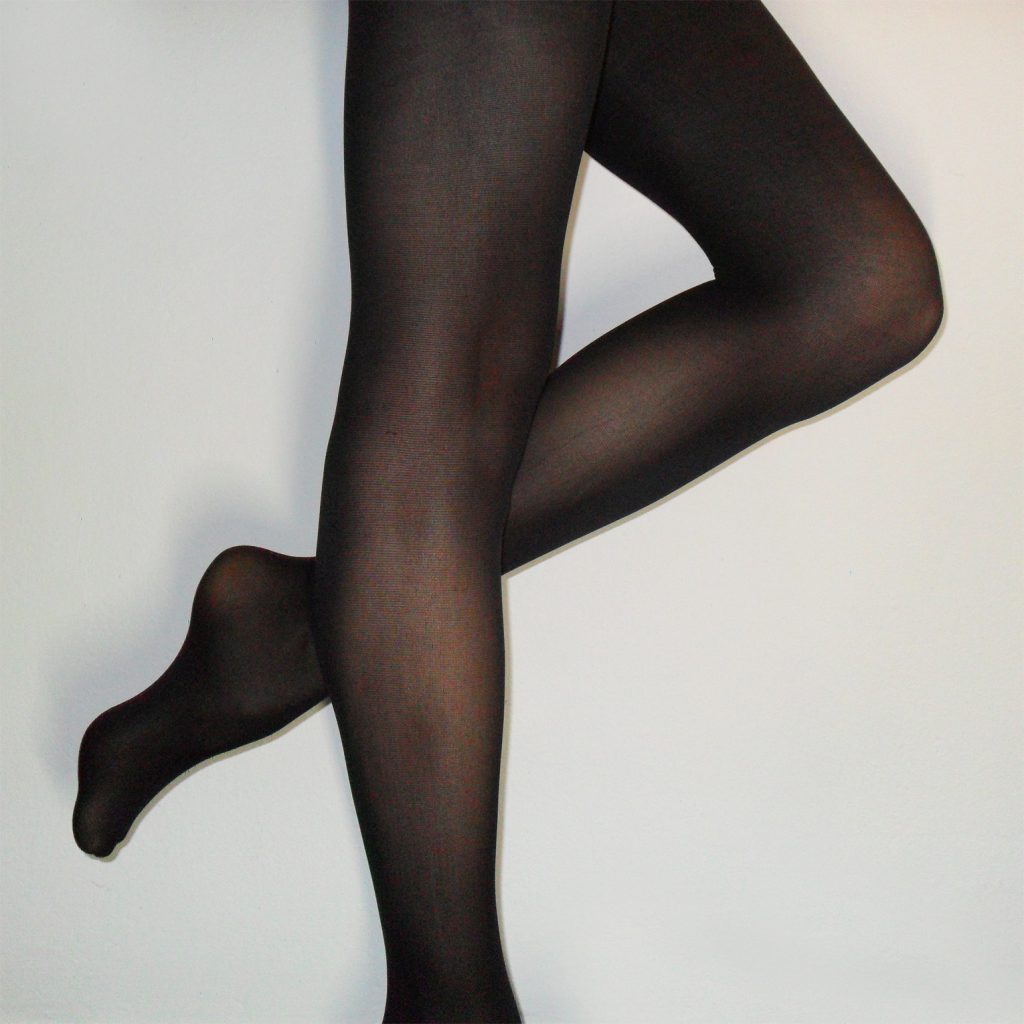
The hosiery: Elle 40 Denier tights*
The appearance: Still within the ‘semi opaque’ category, these tights are still a touch too see-through to offer truly solid coverage.
50 denier
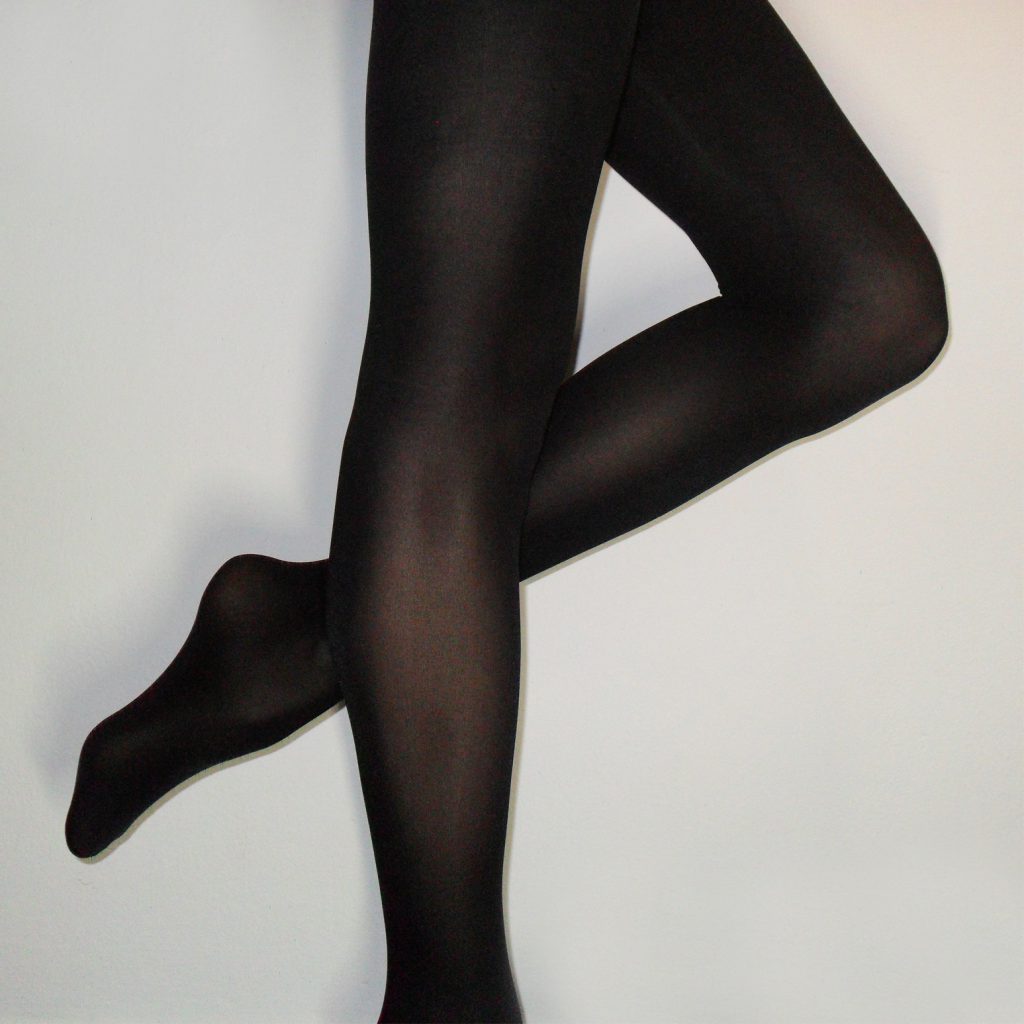
The hosiery: Charnos Satin 50 tights*
The appearance: At 50 denier, we’ve arrived at the category of opaque legwear. My legs look more or less totally black in these tights, and yet as you will see as you scroll down, it’s possible to go darker!
60 denier
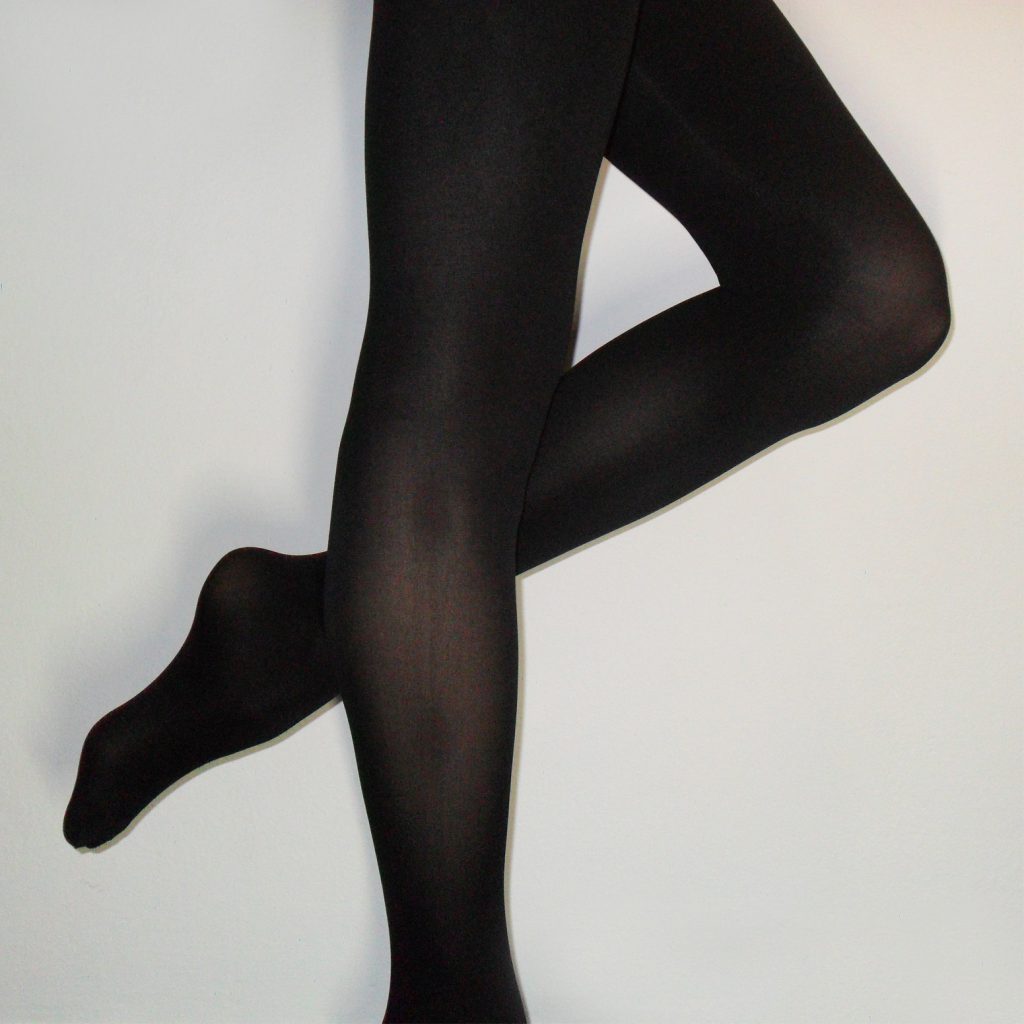
The hosiery: Charnos Matt 60 tights*
The appearance: Similarly opaque to the 50 denier tights above. These are the two deniers, 50 and 60, that I’d recommend if you want a pure black (or other solid colour) appearance in spring or autumn, when higher deniers might cause you to overheat.
70 denier
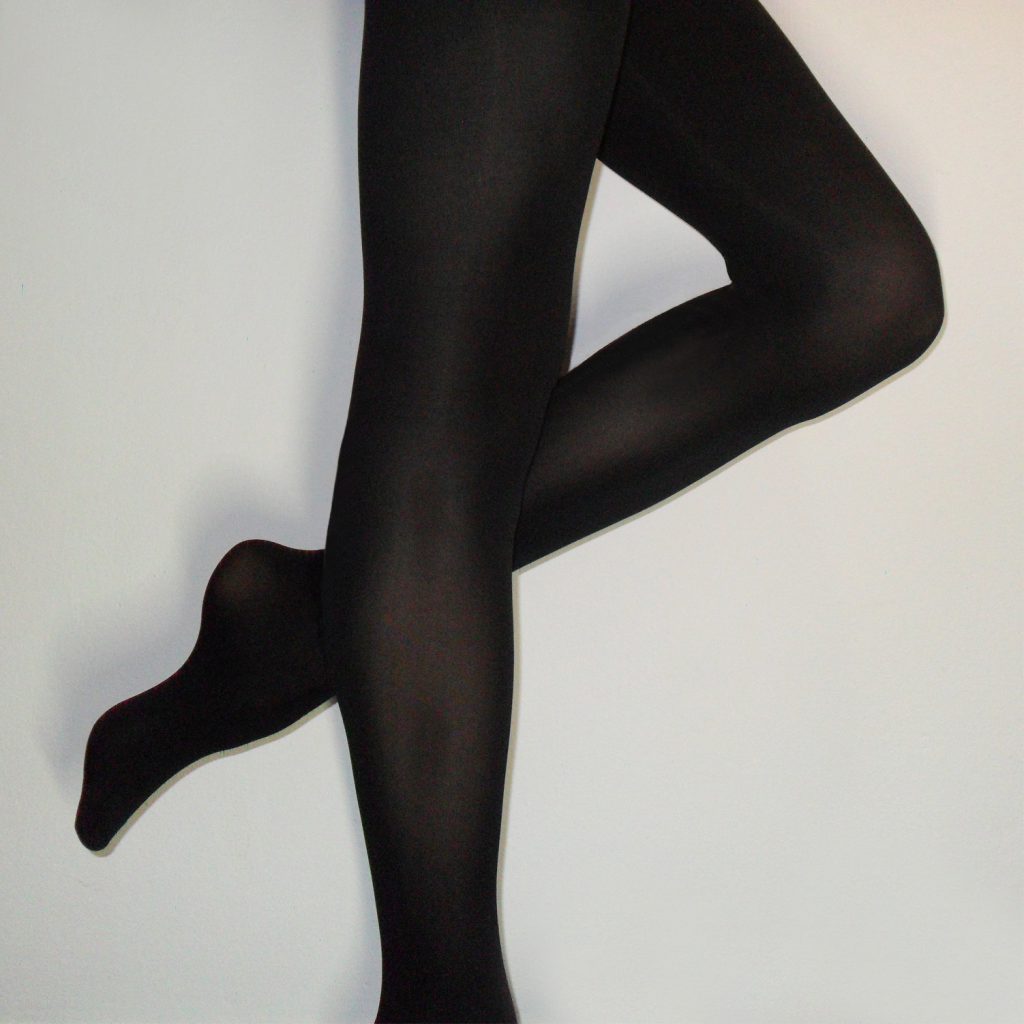
The hosiery: Girardi Marquise tights
The appearance: These tights remain totally opaque even where they’re stretched over a bent knee.
80 denier
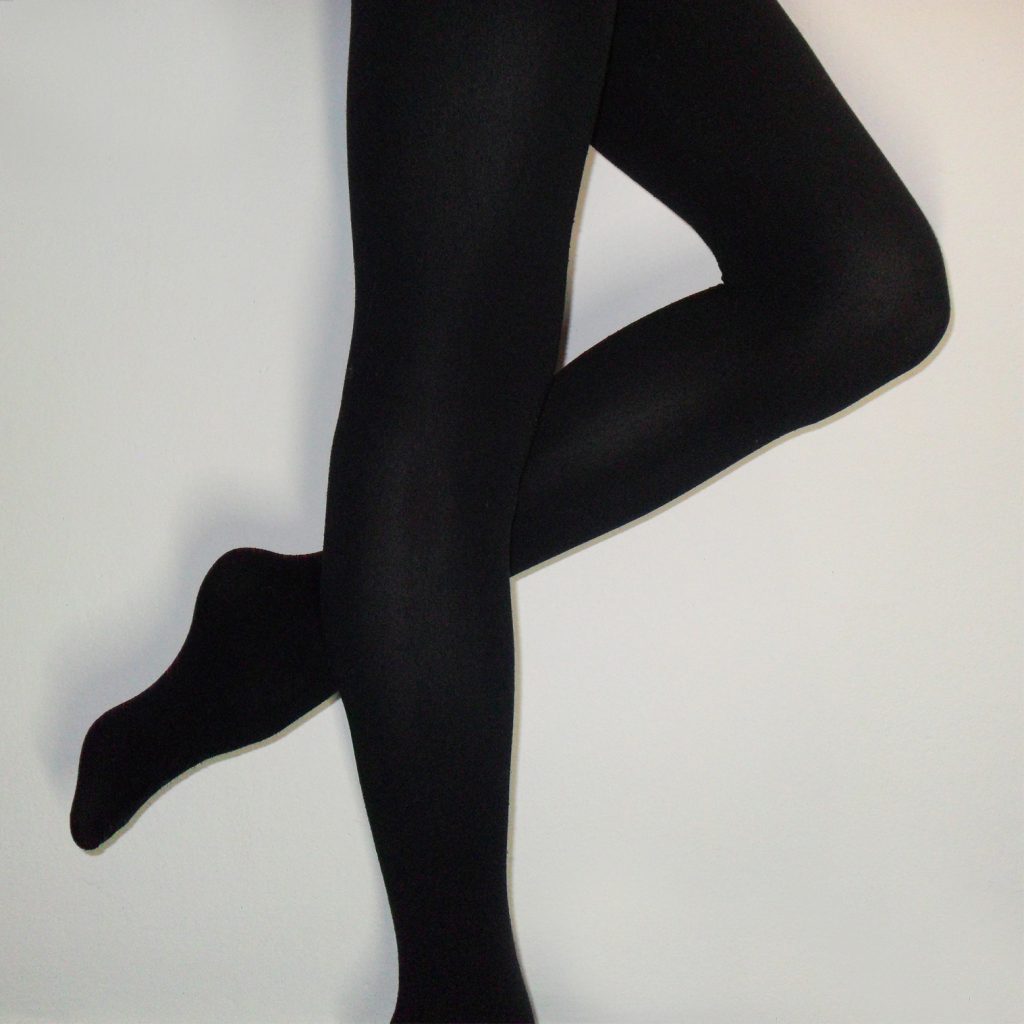
The hosiery: Falke Warm Deluxe tights*
The appearance: 100% solid, opaque coverage! They’re also fabulously warm.
100 denier
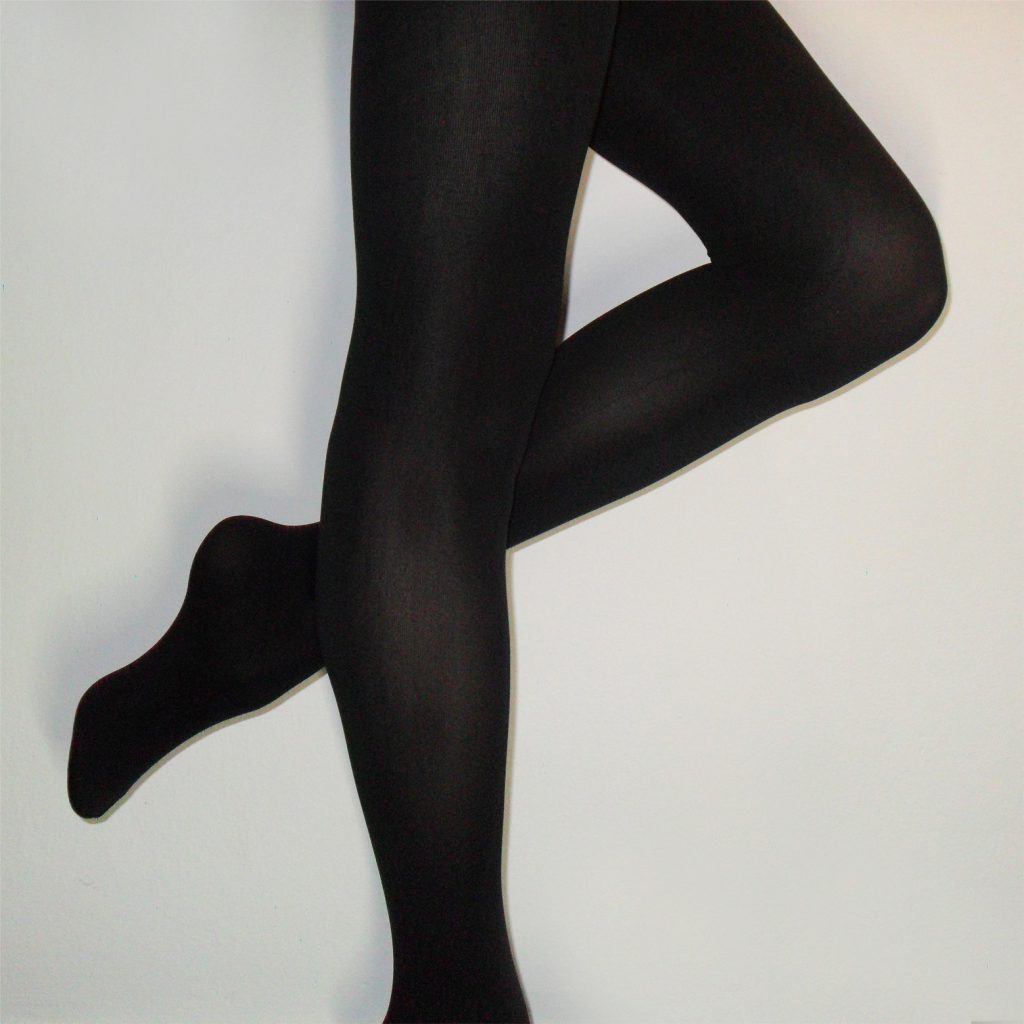
The hosiery: Charnos Matt 100 tights*
The appearance: Also a ‘true opaque’, 100 is an ideal denier choice for cosy legs in winter.
140 denier
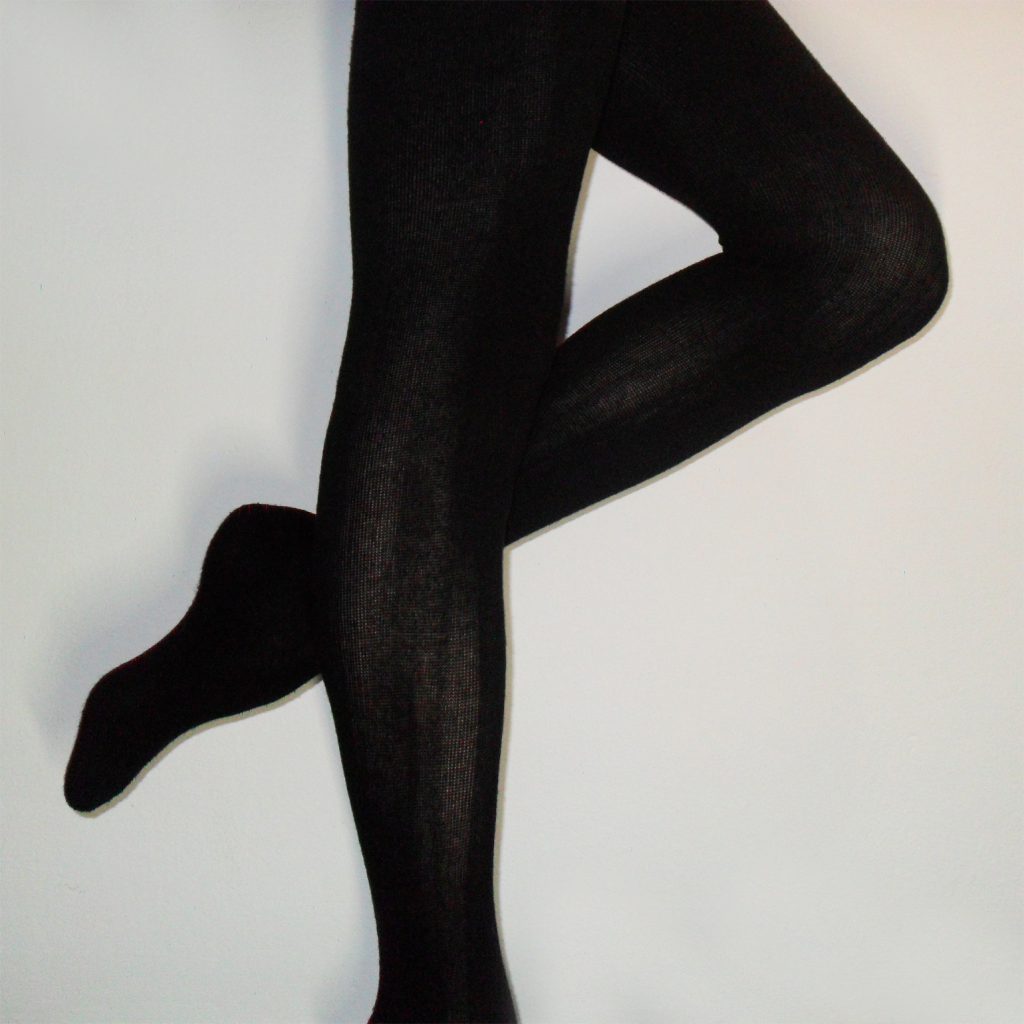
The hosiery: Elle Bamboo tights*
The appearance: As explained at the beginning of this article, I included this pair of tights to illustrate that the knit type also matters when it comes to an opaque vs. transluent finish. Although I would argue that these tights look blacker than the lower-denier pair above, at the same time, more skin is showing through due to the slightly open weave. They are still extremely warm though.
Hosiery denier comparison chart
Here are all of those hosiery denier pictures again, side by side for easier comparison:
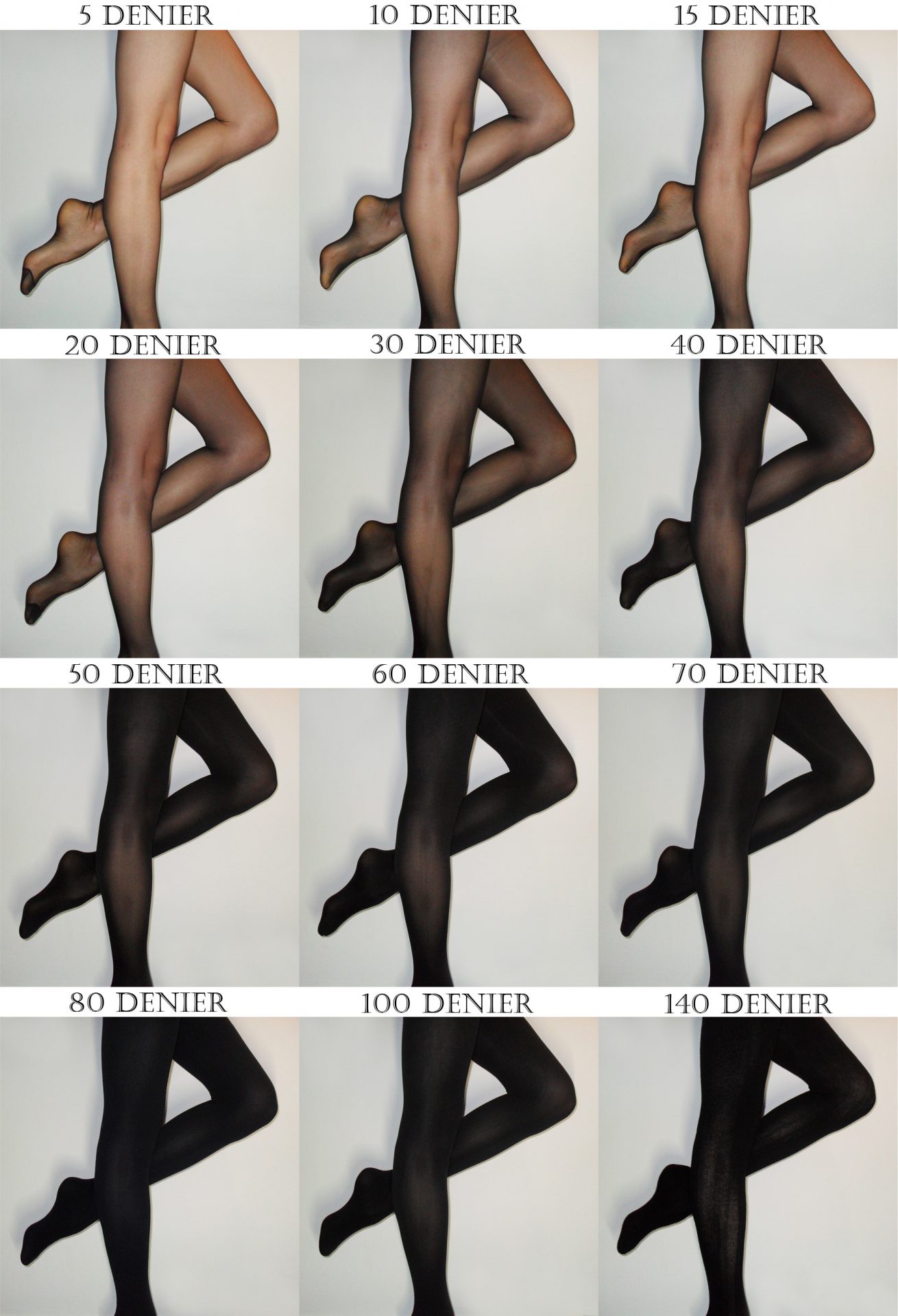
Two more notes on denier
Higher denier = higher durability – at the lower end of the denier scale, an extra 5 or 10 denier can make a huge difference in how durable the hosiery is. If you’re buying a pair of tights or stockings that are going to see frequent wear, I wouldn’t personally recommend going below 20 denier. You might have noticed the lines on the inner thigh of the 10 denier tights above. Those are pulls in the fabric just from putting them on – once!
Microfibre definition – a synthetic hosiery material that’s growing in popularity, microfibre is not a single fibre type but rather a group of them which could be made from polyester, nylon, or something else. To be classed as microfibre, each individual filament must be less than 1 denier, i.e. finer that silk. These fibres are then spun together to form a thicker yarn, but because each filament is so tiny, microfibre hosiery is ultra soft.
Feel free to ask any questions about hosiery denier that I haven’t answered in the comments below. Or just tell me which denier is your favourite to wear!


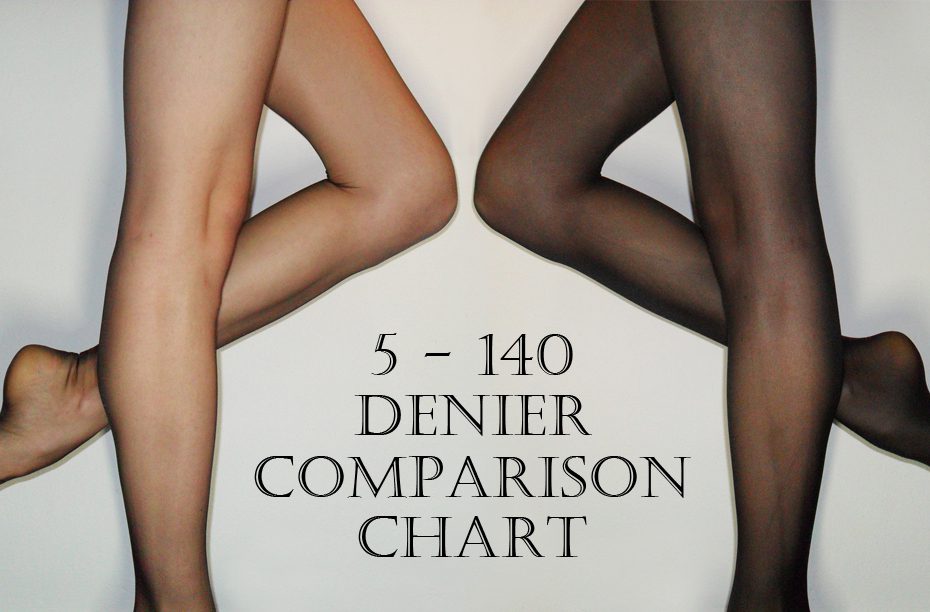
32 comments
Great post! We’ve shared your comparison chart on Pinterest. It’s so cool!
Thank you! ^_^
How are the top of the stocking do they roll?
I don’t remember what the tops of the Pierre Balmain stockings here looked like but without suspenders to hold them up, yes they’ll roll over and roll down. Stockings that stay up on their own are called hold ups, stay ups or thigh highs.
Hi!! I live in India and will be travelling to Edinburgh soon for studies. I was wondering if you could tell me which ones would be good(most importantly, warm) as per the weather there.
Hi Neetika, I’ve never been to Scotland but I’ve been close (Newcastle) in December and I was definitely wearing my thickest tights even there! I’d recommend looking for 100 denier at minimum for winter, but particularly if you will be outside a lot, it may be wise to search for thermal hosiery specifically. I have a post here that you may find useful, where I reviewed/compared thermal tights by five different brands: https://estylingerie.com/2016/12/09/comparison-the-best-thermal-tights-to-keep-warm-this-winter/
Thank you!!
Can you tell me whether the h&m tights are good enough? I want to carry atleast one pair with me and then buy in Scotland itself as per the weather there..
Not sure which H&M tights you mean? I don’t tend to shop there so not sure what the quality of their hosiery is like to be honest.
[…] my hairy legs. That’s when I lernt about dancer and figure skating tights and even terms like “denier”. I read online about sizing and the kinds of tights, but a whole different thing was going and […]
Thank You for posting this denier chart. I have been wearing the 40d sheer to waist in the past several years and the 60d in colder days under my pants. But if I can find the 30 denier in tall or XL sizes I will buy several pairs. My wife been buying the 40 denier for me and some 20 denier pantyhose as well for warmer nights to sleep in. I have to try the 30 denier for sure.
Dear Estelle, I just happened upon your guide to Denier in hosiery. It was very informative. As to your comment about the difference between 5 denier and 10 denier—the 5 denier were “stockings” and the 10 denier were “tights.” I think that is the difference. Wearing tights is different than wearing stockings and that may be why the tights showed stress marks. I began life as as 13 year old wearing real “stockings” and moving to “pantyhose” was a huge difference. In many ways, stockings were so much better. Mainly because you weren’t always pulling them up and down just to go to the restroom so there
was less opportunity to snag them.
Glad you found it informative. I think these 10 denier tights were just a tad too small for me, and also Charnos is a lower-priced brand so not really made to last. (Though, as mentioned in the article, lower denier hosiery will always be fairly delicate regardless of price).
This is so helpful! Thank you so much!
great article! very informative and easy to follow, even for a newbie. thanks so much!
Love the denier explanation
Thank you for a great explanation of denier. It has puzzled me for a long time, so I was very happy to read your article along with the wonderful pictures.
Great article! Thanks
Hi Estelle,
This article is really informative thanks. I’d been looking for a clear guide on what tights’ denier means.
Alex
Great info!! Thanks so much
[…] primeira coisa a prestar atenção é a densidade do material do produto. Mas muitas pessoas não pensam sobre isso. Porque isso não influencia […]
[…] optimal sheerness, opt for a low denier (think anywhere from 5 to 30) because any pair of tights over 40 denier is considered opaque. But […]
[…] Higher denier tights are thicker and warmer, and they will be more robust against fingernails, table edges, and any pointy tights. If you’re looking for tights that can be worn for an extended period of time, a higher denier is the way to go. […]
Excellent explanation and pictures. Thank you. And I didn’t have to scroll through pages of ads to read. 10 out of 10.
Thank you for this great article with clear explanations and the pictures were extremely helpful! This helped me a lot!
what tights are a gemeralds?
Is that a brand? I can’t find anything about it online.
Hi Estelle. Just new to the lingerie scene. Wonderful article. Will be sure to reference you for my article on denier.
Cheers to you from Australia.
Great article
I m going to U.S. mainly NYC and Washington in first week February when it’s very cold. Which denier you would suggest to buy.
Thank you
Hi Nivedita, Google is telling me that’ll be a little colder than the temperatures we were experiencing in Madrid at the start of the year – I wore 80-100 denier tights most days then, so I wouldn’t recommend going any lower than that. If you’re someone who really feels the cold though, look into thermal/fleece-lined tights rather than paying attention to denier.
Thank you for sharing this information. Extremely helpful!
Falke Seidenglatt 15 (a little shine) and Wolford Fatal 15 (matte) are so comfortable! Highly recommended!